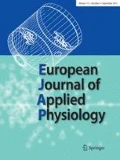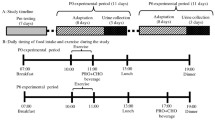Abstract
The purpose of this study was to determine the influence of a comprehensive multi-component nutritional supplement on performance, hormonal, and metabolic responses to an acute bout of resistance exercise. Nine healthy subjects ingested either Muscle Fuel™ (MF) or a matched placebo (PL) for 7 days. Subjects then reported to the laboratory, ingested the corresponding supplement, and performed two consecutive days of heavy resistance exercise testing with associated blood draws. MF supplementation improved vertical jump (VJ) power output and the number of repetitions performed at 80% of one repetition maximum (1RM). Additionally, MF supplementation potentiated growth hormone (GH), testosterone, and insulin-like growth factor-1 responses to exercise. Concentrations of circulating myoglobin and creatine kinase (CK) were attenuated immediately following resistance exercise during the MF trial, indicating that MF partially mediated some form of exercise-induced muscle tissue damage. In summary MF enhanced performance and hormonal responses associated with an acute bout of resistance exercise. These responses indicate that MF supplementation augments the quality of an acute bout of resistance exercise thereby increasing the endocrine signaling and recovery following heavy resistance exercise.




Similar content being viewed by others
References
Adams GR (1998) Role of insulin-like growth factor-I in the regulation of skeletal muscle adaptation to increased loading. Exerc Sport Sci Rev 26:31–60
Berardi JM, Ziegenfuss TN (2003) Effects of ribose supplementation on repeated sprint performance in men. J Strength Cond Res 17:47–52
Borsheim E, Tipton KD, Wolf SE, Wolfe RR (2002) Essential amino acids and muscle protein recovery from resistance exercise. Am J Physiol Endocrinol Metab 283:E648–E657
Brass EP (2000) Supplemental carnitine and exercise. Am J Clin Nutr 72:618S–623S
Bush JA, Kimball SR, O’Connor PM, Suryawan A, Orellana RA, Nguyen HV, Jefferson LS, Davis TA (2003) Translational control of protein synthesis in muscle and liver of growth hormone-treated pigs. Endocrinology 144:1273–1283
Calabrese V, Giuffrida Stella AM, Calvani M, Butterfield DA (2006) Acetylcarnitine and cellular stress response: roles in nutritional redox homeostasis and regulation of longevity genes. J Nutr Biochem 17:73–88
Campbell B, Roberts M, Kerksick C, Wilborn C, Marcello B, Taylor L, Nassar E, Leutholtz B, Bowden R, Rasmussen C, Greenwood M, Kreider R (2006) Pharmacokinetics, safety, and effects on exercise performance of l-arginine alpha-ketoglutarate in trained adult men. Nutrition 22:872–881
Chromiak JA, Antonio J (2002) Use of amino acids as growth hormone-releasing agents by athletes. Nutrition 18:657–661
Corbucci GG, Montanari G, Mancinelli G, D’Iddio S (1990) Metabolic effects induced by L-carnitine and propionyl-L-carnitine in human hypoxic muscle tissue during exercise. Int J Clin Pharmacol Res 10:197–202
Craig SA (2004) Betaine in human nutrition. Am J Clin Nutr 80:539–549
Driessen-Kletter MF, Amelink GJ, Bar PR, van Gijn J (1990) Myoglobin is a sensitive marker of increased muscle membrane vulnerability. J Neurol 237:234–238
Elia D, Stadler K, Horvath V, Jakus J (2006) Effect of soy- and whey protein-isolate supplemented diet on the redox parameters of trained mice. Eur J Nutr 45:259–266
Godfrey RJ, Madgwick Z, Whyte GP (2003) The exercise-induced growth hormone response in athletes. Sports Med 33:599–613
Hansen S, Kvorning T, Kjaer M, Sjogaard G (2001) The effect of short-term strength training on human skeletal muscle: the importance of physiologically elevated hormone levels. Scand J Med Sci Sports 11:347–354
Herbst KL, Bhasin S (2004) Testosterone action on skeletal muscle. Curr Opin Clin Nutr Metab Care 7:271–277
James RS, Kohlsdorf T, Cox VM, Navas CA (2005) 70 microM caffeine treatment enhances in vitro force and power output during cyclic activities in mouse extensor digitorum longus muscle. Eur J Appl Physiol 95:74–82
Karlsson HK, Nilsson PA, Nilsson J, Chibalin AV, Zierath JR, Blomstrand E (2004) Branched-chain amino acids increase p70S6k phosphorylation in human skeletal muscle after resistance exercise. Am J Physiol Endocrinol Metab 287:E1–E7
Kerner J, Hoppel C (2000) Fatty acid import into mitochondria. Biochim Biophys Acta 1486:1–17
Kraemer WJ, Fry AC (1995) Strength testing: development and evaluation of methodology. Human Kinetics, Champaign, IL
Kraemer WJ, Hakkinen K, Newton RU, Nindl BC, Volek JS, McCormick M, Gotshalk LA, Gordon SE, Fleck SJ, Campbell WW, Putukian M, Evans WJ (1999) Effects of heavy-resistance training on hormonal response patterns in younger vs. older men. J Appl Physiol 87:982–992
Kraemer WJ, Marchitelli L, Gordon SE, Harman E, Dziados JE, Mello R, Frykman P, McCurry D, Fleck SJ (1990) Hormonal and growth factor responses to heavy resistance exercise protocols. J Appl Physiol 69:1442–1450
Kraemer WJ, Spiering BA, Volek JS, Ratamess NA, Sharman MJ, Rubin MR, French DN, Silvestre R, Hatfield DL, Van Heest JL, Vingren JL, Judelson DA, Deschenes MR, Maresh CM (2006) Androgenic responses to resistance exercise: effects of feeding and L-carnitine. Med Sci Sports Exerc 38:1288–1296
Kraemer WJ, Volek JS, Bush JA, Putukian M, Sebastianelli WJ (1998) Hormonal responses to consecutive days of heavy-resistance exercise with or without nutritional supplementation. J Appl Physiol 85:1544–1555
Kraemer WJ, Volek JS, French DN, Rubin MR, Sharman MJ, Gomez AL, Ratamess NA, Newton RU, Jemiolo B, Craig BW, Hakkinen K (2003) The effects of L-carnitine L-tartrate supplementation on hormonal responses to resistance exercise and recovery. J Strength Cond Res 17:455–462
Kreider RB (1999) Dietary supplements and the promotion of muscle growth with resistance exercise. Sports Med 27:97–110
Kvorning T, Andersen M, Brixen K, Madsen K (2006) Suppression of endogenous testosterone production attenuates the response to strength training: a randomized, placebo-controlled, and blinded intervention study. Am J Physiol Endocrinol Metab 291:E1325-E1332
Mujika I, Padilla S (1997) Creatine supplementation as an ergogenic aid for sports performance in highly trained athletes: a critical review. Int J Sports Med 18:491–496
Murase T, Haramizu S, Shimotoyodome A, Nagasawa A, Tokimitsu I (2005) Green tea extract improves endurance capacity and increases muscle lipid oxidation in mice. Am J Physiol Regul Integr Comp Physiol 288:R708–R715
Murase T, Haramizu S, Shimotoyodome A, Tokimitsu I, Hase T (2006) Green tea extract improves running endurance in mice by stimulating lipid utilization during exercise. Am J Physiol Regul Integr Comp Physiol 290:R1550–R1556
Nielsen F, Mikkelsen BB, Nielsen JB, Andersen HR, Grandjean P (1997) Plasma malondialdehyde as biomarker for oxidative stress: reference interval and effects of life-style factors. Clin Chem 43:1209–1214
Olthof MR, van Vliet T, Boelsma E, Verhoef P (2003) Low dose betaine supplementation leads to immediate and long term lowering of plasma homocysteine in healthy men and women. J Nutr 133:4135–4138
Op ‘t Eijnde B, Van Leemputte M, Brouns F, Van Der Vusse GJ, Labarque V, Ramaekers M, Van Schuylenberg R, Verbessem P, Wijnen H, Hespel P (2001) No effects of oral ribose supplementation on repeated maximal exercise and de novo ATP resynthesis. J Appl Physiol 91:2275–2281
Paddon-Jones D, Borsheim E, Wolfe RR (2004) Potential ergogenic effects of arginine and creatine supplementation. J Nutr 134:2888S–2894S; discussion 2895S
Pikosky MA, Gaine PC, Martin WF, Grabarz KC, Ferrando AA, Wolfe RR, Rodriguez NR (2006) Aerobic exercise training increases skeletal muscle protein turnover in healthy adults at rest. J Nutr 136:379–383
Rasmussen BB, Phillips SM (2003) Contractile and nutritional regulation of human muscle growth. Exerc Sport Sci Rev 31:127–131
Ratamess NA, Kraemer WJ, Volek JS, Maresh CM, Vanheest JL, Sharman MJ, Rubin MR, French DN, Vescovi JD, Silvestre R, Hatfield DL, Fleck SJ, Deschenes MR (2005) Androgen receptor content following heavy resistance exercise in men. J Steroid Biochem Mol Biol 93:35–42
Rawson ES, Volek JS (2003) Effects of creatine supplementation and resistance training on muscle strength and weightlifting performance. J Strength Cond Res 17:822–831
Rodenburg JB, Bar PR, De Boer RW (1993) Relations between muscle soreness and biochemical and functional outcomes of eccentric exercise. J Appl Physiol 74:2976–2983
Rogozkin V (1979) Metabolic effects of anabolic steroid on skeletal muscle. Med Sci Sports 11:160–163
Rommel C, Bodine SC, Clarke BA, Rossman R, Nunez L, Stitt TN, Yancopoulos GD, Glass DJ (2001) Mediation of IGF-1-induced skeletal myotube hypertrophy by PI(3)K/Akt/mTOR and PI(3)K/Akt/GSK3 pathways. Nat Cell Biol 3:1009–1013
Shao ZH, Vanden Hoek TL, Li CQ, Schumacker PT, Becker LB, Chan KC, Qin Y, Yin JJ, Yuan CS (2004) Synergistic effect of Scutellaria baicalensis and grape seed proanthocyanidins on scavenging reactive oxygen species in vitro. Am J Chin Med 32:89–95
Smilios I, Pilianidis T, Karamouzis M, Tokmakidis SP (2003) Hormonal responses after various resistance exercise protocols. Med Sci Sports Exerc 35:644–654
Tipton KD, Ferrando AA, Phillips SM, Doyle D Jr, Wolfe RR (1999) Postexercise net protein synthesis in human muscle from orally administered amino acids. Am J Physiol 276:E628–E634
Tipton KD, Rasmussen BB, Miller SL, Wolf SE, Owens-Stovall SK, Petrini BE, Wolfe RR (2001) Timing of amino acid-carbohydrate ingestion alters anabolic response of muscle to resistance exercise. Am J Physiol Endocrinol Metab 281:E197–E206
Volek JS, Kraemer WJ, Rubin MR, Gomez AL, Ratamess NA, Gaynor P (2002) L-Carnitine L-tartrate supplementation favorably affects markers of recovery from exercise stress. Am J Physiol Endocrinol Metab 282:E474–E482
Volek JS, Ratamess NA, Rubin MR, Gomez AL, French DN, McGuigan MM, Scheett TP, Sharman MJ, Hakkinen K, Kraemer WJ (2004) The effects of creatine supplementation on muscular performance and body composition responses to short-term resistance training overreaching. Eur J Appl Physiol 91:628–637
Volek JS, Rawson ES (2004) Scientific basis and practical aspects of creatine supplementation for athletes. Nutrition 20:609–614
Wiles JD, Coleman D, Tegerdine M, Swaine IL (2006) The effects of caffeine ingestion on performance time, speed and power during a laboratory-based 1 km cycling time-trial. J Sports Sci 24:1165–1171
Williams C (1985) Nutritional aspects of exercise-induced fatigue. Proc Nutr Soc 44:245–256
Williams JH (1991) Caffeine, neuromuscular function and high-intensity exercise performance. J Sports Med Phys Fitness 31:481–489
Acknowledgments
The investigators want to thank a dedicated group of test subjects who made this study possible. In addition, we thank a dedicated group of research assistants and registered dieticians for their help in the dietary control and data collection for this project. This study was supported in part by a grant from AdvoCare Inc.
Author information
Authors and Affiliations
Corresponding author
Rights and permissions
About this article
Cite this article
Kraemer, W.J., Hatfield, D.L., Spiering, B.A. et al. Effects of a multi-nutrient supplement on exercise performance and hormonal responses to resistance exercise. Eur J Appl Physiol 101, 637–646 (2007). https://doi.org/10.1007/s00421-007-0535-3
Accepted:
Published:
Issue Date:
DOI: https://doi.org/10.1007/s00421-007-0535-3




